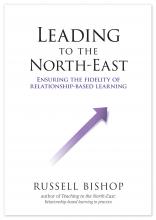Leading to the North-East : Ensuring the Fidelity of Relationship-Based Learning
- Unit price
- / per
-
Author:Russell Bishop
-
ISBN:9781990040887
-
Publication Date:June 2023
-
Edition:1
-
Pages:
-
Binding:Paperback
-
Publisher:New Zealand Council for Educational Research
-
Country of Publication:New Zealand


A Back Order button means that we don’t have the book in stock at our store. It may already be on order – or we can order it for you from a publisher or distributor at no additional cost.
As we source items from around the globe, a back-order can take anywhere from 5 days to several weeks to arrive, depending on the title.
To check how long this might take, you’re welcome to contact us and we can provide an ETA or any other information you need. We recommend checking the timeframe before committing to an online order.
Leading to the North-East : Ensuring the Fidelity of Relationship-Based Learning
- Unit price
- / per
-
Author:Russell Bishop
-
ISBN:9781990040887
-
Publication Date:June 2023
-
Edition:1
-
Pages:
-
Binding:Paperback
-
Publisher:New Zealand Council for Educational Research
-
Country of Publication:New Zealand
Description
In his 2019 book Teaching to the North-East: Relationship-based learning in practice Professor Bishop identified how Maori and other marginalised students, such as the children of migrant, refugee and faith-based groups and neuro- and gender-diverse children, can benefit from a North-East relationship-based pedagogy. They do so in ways that increases equity, excellence, and cultural sustainability.
Now in Leading to the North-East, he demonstrates how North-East leaders ensure teachers are able to implement and sustain the North-East relationship-based pedagogy with fidelity
The problem of Maori underachievement is endemic because we allow it, falsely label it, blame the culture and students, and believe it is intractable. Russell Bishop shows that we already know how to truly improve the learning lives of Maori (and thence all other students), such that their culture is not left at the gate. His anger, insights, and hope imbue this book, from the 3 case schools, the model of learning and instruction, and his lifetime evidence of the major impacts of his program. He shows that it only takes 2 years for every school in NZ to truly make a difference IF we want to and commit to Bishops fundamental premises and ideas. It can be done, it has been done, it should be done.
Adding product to your cart
You may also like
A Back Order button means that we don’t have the book in stock at our store. It may already be on order – or we can order it for you from a publisher or distributor at no additional cost.
As we source items from around the globe, a back-order can take anywhere from 5 days to several weeks to arrive, depending on the title.
To check how long this might take, you’re welcome to contact us and we can provide an ETA or any other information you need. We recommend checking the timeframe before committing to an online order.
You may also like
You may also like
-
In his 2019 book Teaching to the North-East: Relationship-based learning in practice Professor Bishop identified how Maori and other marginalised students, such as the children of migrant, refugee and faith-based groups and neuro- and gender-diverse children, can benefit from a North-East relationship-based pedagogy. They do so in ways that increases equity, excellence, and cultural sustainability.
Now in Leading to the North-East, he demonstrates how North-East leaders ensure teachers are able to implement and sustain the North-East relationship-based pedagogy with fidelity
The problem of Maori underachievement is endemic because we allow it, falsely label it, blame the culture and students, and believe it is intractable. Russell Bishop shows that we already know how to truly improve the learning lives of Maori (and thence all other students), such that their culture is not left at the gate. His anger, insights, and hope imbue this book, from the 3 case schools, the model of learning and instruction, and his lifetime evidence of the major impacts of his program. He shows that it only takes 2 years for every school in NZ to truly make a difference IF we want to and commit to Bishops fundamental premises and ideas. It can be done, it has been done, it should be done.
-
-
Author: Russell BishopISBN: 9781990040887Publication Date: June 2023Edition: 1Pages:Binding: PaperbackPublisher: New Zealand Council for Educational ResearchCountry of Publication: New Zealand
In his 2019 book Teaching to the North-East: Relationship-based learning in practice Professor Bishop identified how Maori and other marginalised students, such as the children of migrant, refugee and faith-based groups and neuro- and gender-diverse children, can benefit from a North-East relationship-based pedagogy. They do so in ways that increases equity, excellence, and cultural sustainability.
Now in Leading to the North-East, he demonstrates how North-East leaders ensure teachers are able to implement and sustain the North-East relationship-based pedagogy with fidelity
The problem of Maori underachievement is endemic because we allow it, falsely label it, blame the culture and students, and believe it is intractable. Russell Bishop shows that we already know how to truly improve the learning lives of Maori (and thence all other students), such that their culture is not left at the gate. His anger, insights, and hope imbue this book, from the 3 case schools, the model of learning and instruction, and his lifetime evidence of the major impacts of his program. He shows that it only takes 2 years for every school in NZ to truly make a difference IF we want to and commit to Bishops fundamental premises and ideas. It can be done, it has been done, it should be done.
-
Author: Russell BishopISBN: 9781990040887Publication Date: June 2023Edition: 1Pages:Binding: PaperbackPublisher: New Zealand Council for Educational ResearchCountry of Publication: New Zealand
-



